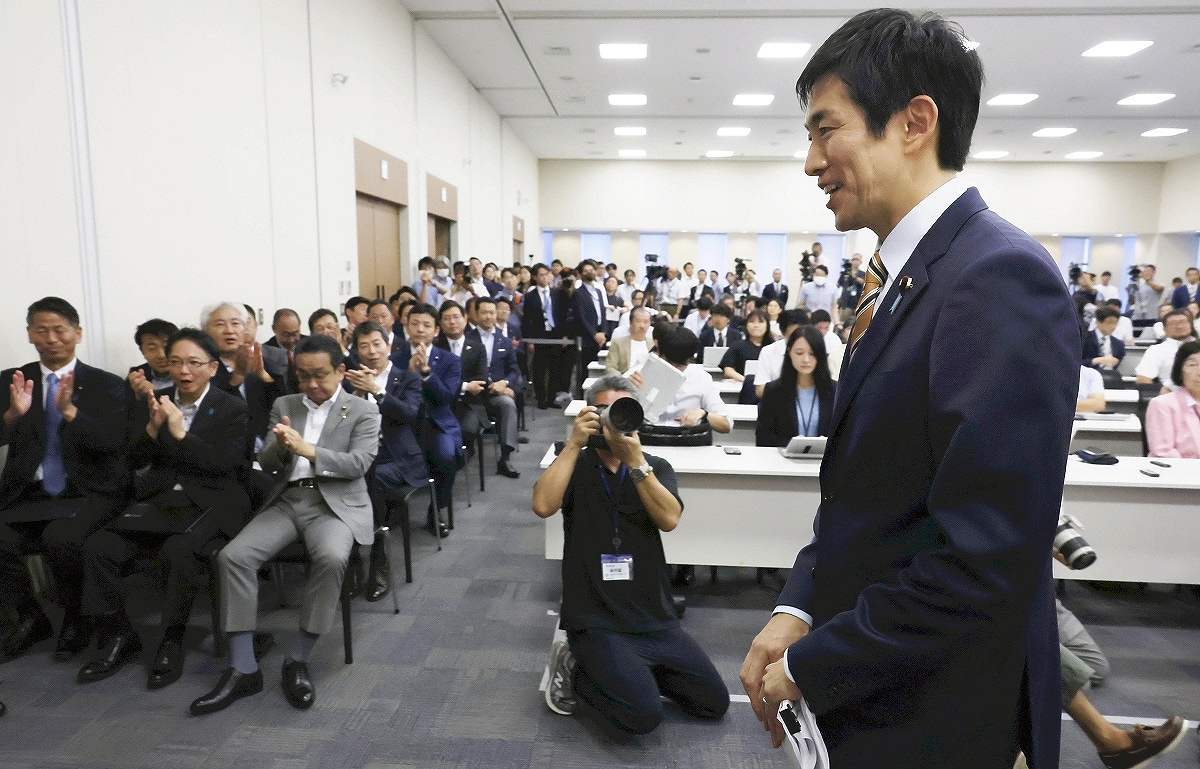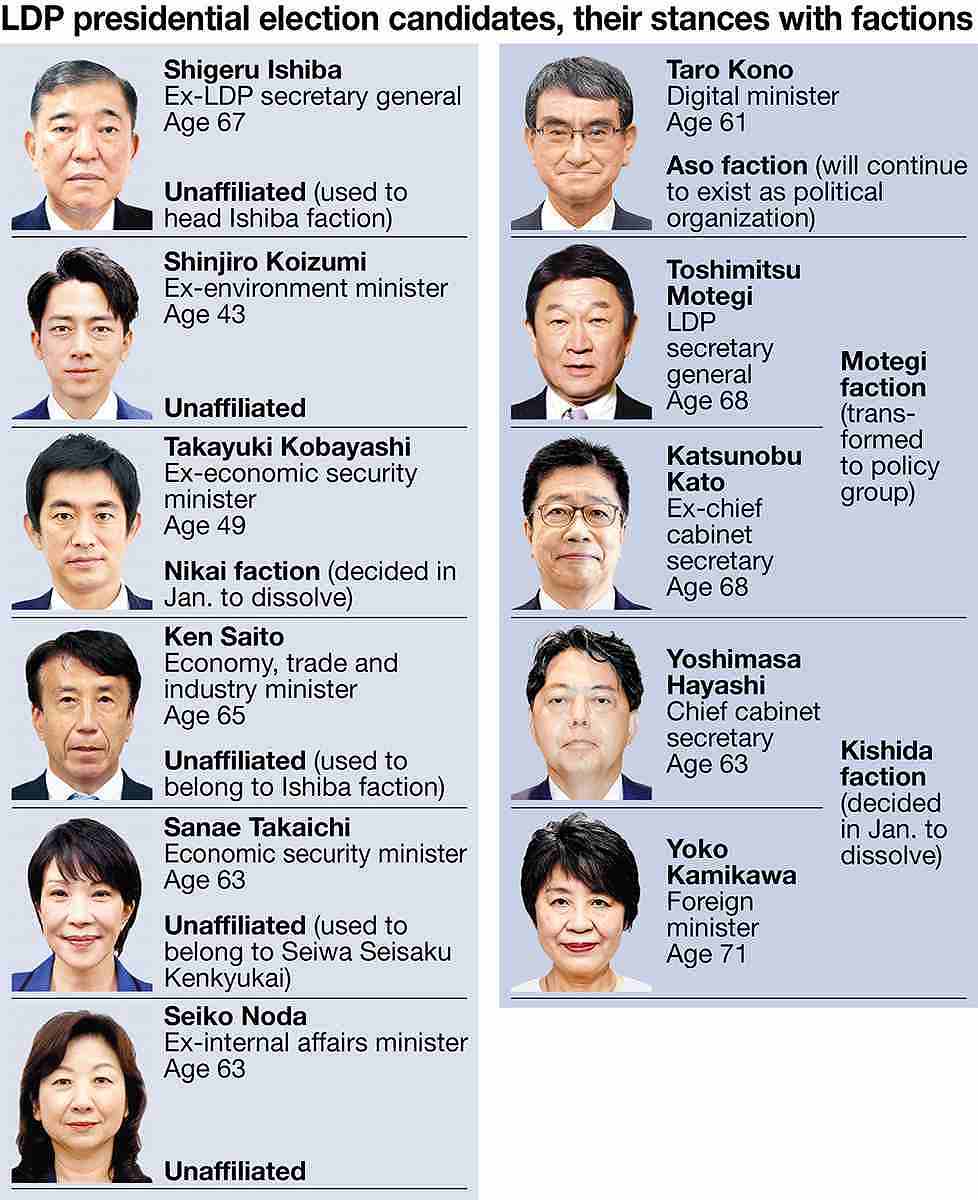Factions Play Less Central Role in Japan’s LDP Leadership Race; Some Candidates Utilize Group Ties; Others Eschew Them

Lawmakers from various Liberal Democratic Party factions as well as those not belonging to any faction attend a press conference held by former economic security minister Takayuki Kobayashi, right, at the Diet Building on Monday.
20:00 JST, August 20, 2024
The Liberal Democratic Party presidential election effectively kicked off when former economic security minister Takayuki Kobayashi announced his candidacy on Monday.
The race takes place at a time when most party factions have decided to dissolve, but faction-based ties remain strong. Candidates are likely to vary in the extent to which they distance themselves from such ties.
Abe faction tinge

“The fact that I am standing here now, regardless of faction, is a symbol of the LDP trying to change,” Kobayashi said at a press conference announcing his candidacy on Monday in the Diet Building. “I won’t seek support from any faction.”
Twenty-four junior or middle-ranking LDP Diet members who attended the press conference included members of the Nikai faction — to which Kobayashi also belongs, and which is in the process of dissolving — as well as the Abe faction, the Kishida faction, the Aso faction and the now dissolved Moriyama faction. Some were unaffiliated with any faction.
“I have friends who stood up for me, transcending factions and generations, and who sympathize with my aims,” Kobayashi said, stressing his stance to focus on cross-factional and generational change.
Among the 24 Diet members, the largest number, 11, were from the Abe faction.
Earlier this month, Kobayashi stirred controversy with his comment on an internet program saying that the removal of Abe faction lawmakers from key positions as punishment for violations of the Political Funds Control Law needed to be reviewed.
Asked on Monday about the treatment of Abe faction members, Kobayashi limited himself to cautious phrasing, saying, “[Regarding those who were not punished by the party,] we will appoint the right people to the right positions once we have gained a certain level of public understanding.”
An LDP member who served in a cabinet post remarked that there was “too much of an Abe faction tinge in his support.”
Unaffiliated members confer
Two unaffiliated party members — former Environment Minister Shinjiro Koizumi and Economy, Trade and Industry Minister Ken Saito — will likely raise the banner of a “faction-free” policy if they run for party president.
Koizumi is said to have told those around him that the presidential election “should not be decided on the basis of factional calculations.” Former Prime Minister Yoshihide Suga, who has high hopes for Koizumi, greatly values being “free of the factional approach.”
On Monday, Koizumi and Saito met in Saito’s office and shared the understanding that “the presidential election should not be faction-driven.” The two are close friends, having been elected to the House of Representatives for the first time in 2009 when the LDP faced a major headwind. Some observers believe that they may work together in some way.
Former LDP Secretary General Shigeru Ishiba, who is also unaffiliated, hopes to broaden his support without relying on a faction. On Sunday evening, however, Ishiba had dinner with former Internal Affairs and Communications Minister Ryota Takeda, who had held a key role in the Nikai faction, and others in Tokyo. Some in the party speculated that Ishiba may have sought the help of the Nikai faction in order to secure the nominations from 20 LDP Diet members needed to officially qualify him as a candidate.
Hybrid type
Three candidates — digital minister Taro Kono of the Aso faction; Chief Cabinet Secretary Yoshimasa Hayashi, formerly a top official of the Kishida faction’s No. 2 position; and LDP Secretary General Toshimitsu Motegi, who leads the Motegi faction — are seeking support of their own faction members.
The 54-member Aso faction is the only faction that is keeping its traditional form, but even the other factions — despite having decided to dissolve — maintain ties among their members. Utilizing factional connections can make it easier for candidates to plan to secure the necessary nominations, as has been done in the past.
Even so, as they will not be immune to criticism if they rely entirely on factions, Kono, Hayashi and Motegi will likely aim for a “hybrid” approach by seeking support from members of other factions and unaffiliated members as well.
The Kishida faction, in particular, is cautious because Prime Minister Fumio Kishida expressed his hope for “a presidential election free from factional inference” when announcing his intention not to run for the race. Under the circumstances, it would be seen as strange if the faction makes a show of support for Hayashi, another member on the faction said. A meeting on Tuesday of Kishida faction lawmakers that Hayashi was scheduled to attend was canceled.
Foreign Minister Yoko Kamikawa from the Kishida faction and former Chief Cabinet Secretary Katsunobu Kato from the Motegi faction have also expressed interest in running for presidency.
“Hayashi and Motegi would not be able to expand their support if they rely solely on their factions,” a veteran Diet member said.
Related Tags
Top Articles in Politics
-

Japan PM Takaichi’s Cabinet Resigns en Masse
-

Sanae Takaichi Elected Prime Minister of Japan; Keeps All Cabinet Appointees from Previous Term
-

Japan’s Govt to Submit Road Map for Growth Strategy in March, PM Takaichi to Announce in Upcoming Policy Speech
-

LDP Wins Historic Landslide Victory
-

LDP Wins Landslide Victory, Secures Single-party Majority; Ruling Coalition with JIP Poised to Secure Over 300 seats (UPDATE 1)
JN ACCESS RANKING
-

Producer Behind Pop Group XG Arrested for Cocaine Possession
-

Japan PM Takaichi’s Cabinet Resigns en Masse
-

Man Infected with Measles Reportedly Dined at Restaurant in Tokyo Station
-

Israeli Ambassador to Japan Speaks about Japan’s Role in the Reconstruction of Gaza
-

Videos Plagiarized, Reposted with False Subtitles Claiming ‘Ryukyu Belongs to China’; Anti-China False Information Also Posted in Japan























